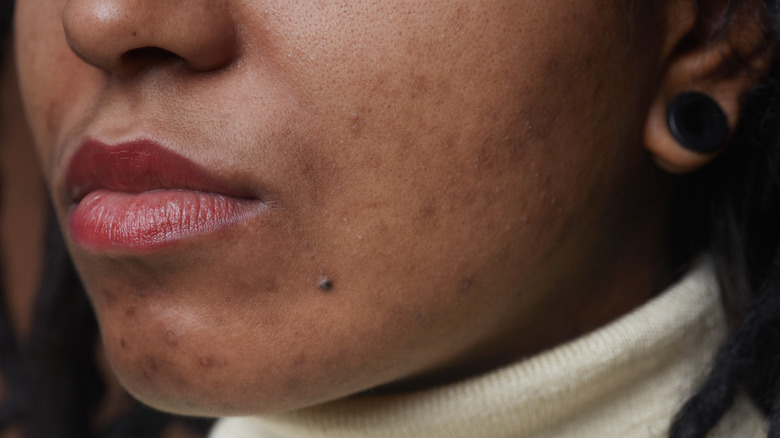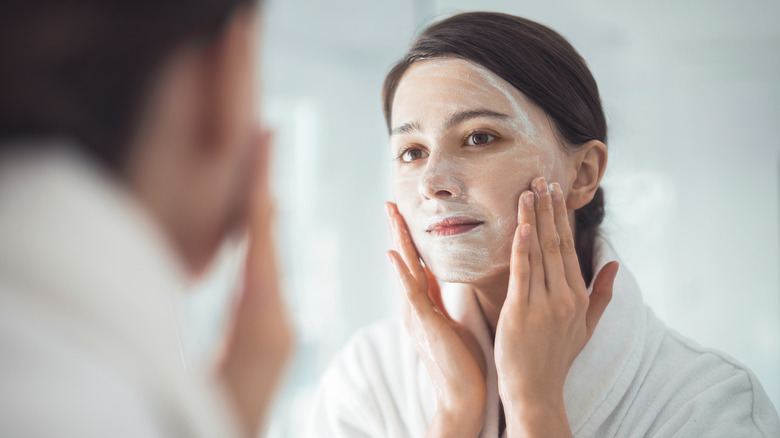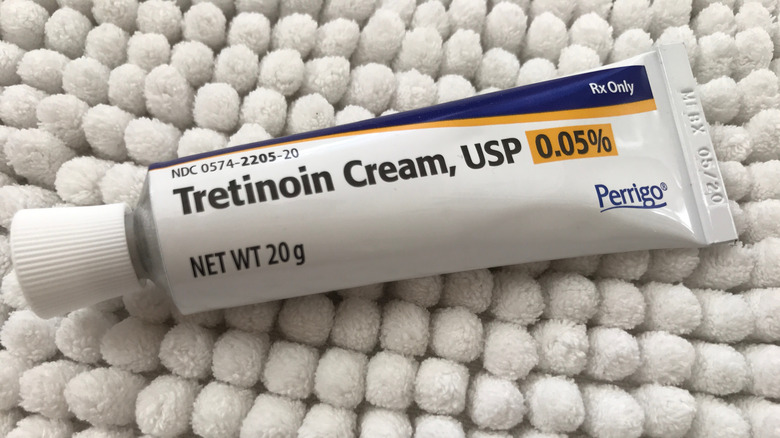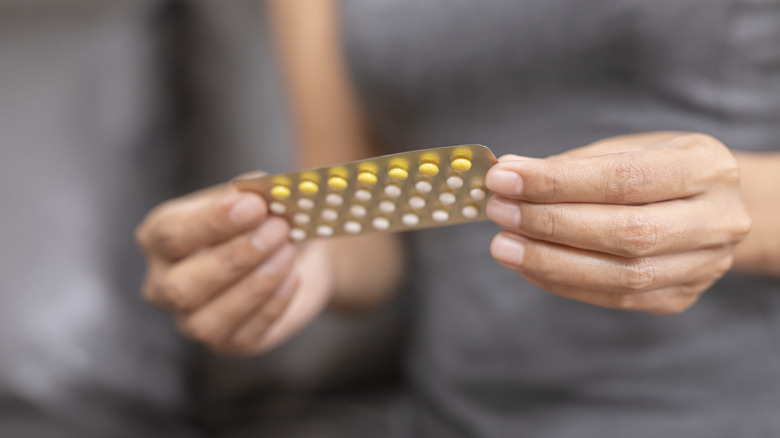How To Deal With Hormonal Acne During Menopause
Acne is usually associated with teenage life, but it can affect anyone. Estimates show that about 26% of women aged 31 to 40 and 12% of those aged 41 to 50 have some form of acne, reports a 2017 review published in The Journal of Clinical and Aesthetic Dermatology. Men can experience these issues, too. Millions of women are struggling with hormonal acne during menopause.
As the scientists note, adult female acne is often due to hormonal fluctuations. Genetics, stress, diet, and cigarette smoking may play a role, too. For example, comedonal acne — a skin condition that causes whiteheads and blackheads — appears to be more common in adult women who smoke. Your diet and beauty routine may have an impact as well. "The hormones that cause this type of acne are fluctuations of estrogen and progesterone, which both vary widely throughout the menstrual cycle month," explains dermatologist S. Manjula Jegasothy (via Yahoo! Life). She also points out that estrogen, progesterone, and the stress hormone cortisol may affect testosterone levels in women, which in turn can cause adult acne.
Treatment options depend on the cause and severity of acne breakouts. Over-the-counter cleansers and supplements may help, but they don't work for everyone. Home remedies are rarely effective.
Cleanse your skin daily
Daily facial cleansing unclogs your pores, removing makeup residue, bacteria, and other debris. Therefore, it may benefit acne-prone skin. Ideally, choose a facial cleanser with alpha or beta hydroxy acids. Topical salicylic acid, for example, may reduce inflammation and redness while exfoliating your skin, notes the U.S. National Library of Medicine. When used regularly, it may help treat acne and improve your complexion.
Alpha-hydroxy agents (AHAs) can help, too. These organic compounds stimulate skin renewal and remove dead skin cells while protecting against oxidative stress (per a 2018 article in Molecules, posted at the National Center for Biotechnology Information). Moreover, they offset some of the effects of ultraviolet (UV) radiation, leading to younger-looking skin. Thanks to their mild peeling effect, AHAs may reduce acne and boost skin health.
As a general rule, it's best to avoid harsh facial cleansers. Dermatologist S. Manjula Jegasothy recommends using either salicylic/glycolic acid or probiotic cleansers (via Yahoo! Life). She explains that topical probiotics restore the skin's pH balance, protecting against acne-causing bacteria. These treatment options are suitable for mild acne. Moderate and severe cases require a different approach.
Use topical retinoids for mild to moderate acne
Tretinoin and other topical retinoids may help treat mild to moderate hormonal acne during menopause. These compounds inhibit cellular inflammation and reduce visible lesions while preventing new lesions, according to research published in Dermatology and Therapy, also posted at the National Center for Biotechnology Information. "Many patients want to start right off with tretinoin, but I advise them to use the least-intense retinoid formula they can find, and use it every other night to start, slowly building up," dermatologist Tina Alster told the American Academy of Dermatology Association (AAD).
Unfortunately, topical retinoids are not suitable for all skin types and may not be safe for pregnant women. "If someone has a lot of redness or inflammation in their skin, they should avoid retinoids and ask their dermatologist about other therapies that are more directed to a condition called rosacea," says dermatologist Anne Chapas (via the AAD). These compounds may also cause irritation, so they're not the best choice for sensitive skin.
However, there are a couple of things you can do to minimize tolerability issues. For starters, use a topical retinoid every other day during the first two to four weeks of treatment. Leave it on for 30 to 60 minutes and then wash it off (per Dermatology and Therapy). Since these products can increase skin's sensitivity to the sun, it's recommended to use them at bedtime and wear sunscreen during the day, says Dr. Alster. Note that it's normal to experience some irritation during the first two weeks of treatment.
Should you try hormonal therapy for severe acne?
Some doctors prescribe oral contraceptives and other types of hormonal therapy for severe acne. "The most effective treatments focus on correcting the hormonal imbalance," said dermatologist Ife J. Rodney in a recent interview with Byrdie. Birth control pills, for example, may help balance estrogen and progesterone levels, reducing acne breakouts in adult women. The downside is that you may experience nausea, headaches, weight gain, mood swings, low libido, or more serious side effects, such as blood clots and high blood pressure, warns Brown University.
Hormone replacement therapy, or HRT, isn't safer either. Rodney says that it may actually worsen acne due to progestin, a synthetic form of progesterone. HRT has also been linked to a higher risk of breast cancer, stroke, heart disease, and other conditions, notes the Mayo Clinic.
Dealing with hormonal acne during menopause can be frustrating, but it's not worth risking your health. Discuss your options with a dermatologist and don't rush into making a decision. As Rodney points out, retinoids and other traditional acne-fighting ingredients can make quite a difference.



